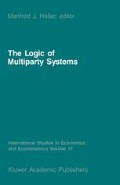Abstract
Politico-economic models are meant to capture in a quantitative way some important aspects of the relationship between the economy and politics, and so to contribute to the development of a positive theory of government behaviour. A distinction can be made between “reaction function models”, “popularity models”, and “interest group models”. The first group of models is engaged in the estimation of the relationship between instruments of government policy, mainly fiscal policy, but also monetary policy, and the state of the economy measured by variables such as inflation, unemployment and the growth of personal income (see Alt and Chrystal (1983) and Mosley (1984)). The most important shortcoming of these models is that a behavioural-theoretic underpinning of the found relationships is missing (the facts axe supposed to speak). Popularity models particularly focus on the relationship between government (politicians, that is) and voters. An interesting model seems to be the one developed by Frey and Schneider (1978a, 1978b, 1979, 1982), which will be discussed in the next section.
Access this chapter
Tax calculation will be finalised at checkout
Purchases are for personal use only
Preview
Unable to display preview. Download preview PDF.
References
Alt, J.E. and A.K. Christal (1983). Political Economics. Harvester Press, Sussex.
Becker, G.S. (1983). “Competition Among Pressure Groups for Political Influence”, Quarterly Journal of Economics, 98, 371–400.
Bestek 81 (1978). Hoofdlijncn van het Financide cn Sociaal-Economiscbe Bcicid voor de Middellange Termijn.Den Haag.
Buchanan, J.M., R.D. TOLLISON and G. TULLOCK (1980). Towards a Theory of the Rent Seeking Society. College Station, Texas. Texas A + M University Press.
Borooah, V.K. and F. Van der Ploeg (1983). Political Aspects of the Economy. Cambridge University Press, Cambridge.
Chappell, H.W. (1983). “Presidential Popularity and Macroeconomic Performance: Are Voters Really so Naive”, Review of Economics and Statistics, 65, 385–392.
Frey, B.S. and F. Schneider (1978a). “A Politico-Economic Model of the United Kingdom”, Economic Journal, 88, 243–253
Frey, B.S. and F. Schneider (1978b). “An Empirical Study of Politico-Economic Interaction in the United States”, Review of Economics and Statistics, 60 /2, 172–183.
Frey, B.S. and F. Schneider (1979). “An Econometric Model with an Endogenous Government Sector”, Public Choice, 34 /1, 29–43
Frey, B.S. and F. Schneider (1982). “Politico-Economic Models in Competition with Alternative Models: Which Predict Better”, European Journal of Political Research, 10, 241–254
Keizer, P.K. and A.P. Van Veen (1984). Voters Reaction as a Welfare State Stabilizer. Research Memorandum, 84-010. Limburg University.
Kirchgässner, G. (1984). Rationality, Causality and the Relation between Economic Conditions and the Popularity of Parties. Institute for Wirtschaftsforschung. ETH Zurich.
MacRae, D.C. (1981), On the Political Business Cycle, in D.A. Hibbs and H. Fassbender (eds.). Contemporary Political Economy. North Holland, Amsterdam.
Maddala, G.S. (1983). Limited Dependent and Qualitative Variables in Econometrics. Cambridge University Press. Cambridge.
Mosley, P. (1984). The Making of Economic Policy. Harvester Press. Brighton.
Paldam, M. (1981). “A Preliminary Survey of the Theories and Findings of Vote and Popularity Functions”, European Journal of Political Research, 9, 181–199.
Renaud, P.S.A. and F.A.A.M. Van Winden (1984). Tax Rate and Government Expenditure. Paper presented at the Econometric Society European Meeting 1984 in Madrid, and at the European Meeting of the Public Choice Society 1984 in Munich.
Schneider, F. and B.S. Frey (1984), Public Attitudes Towards Inflation and Unemployment and Their Influence on Government Behaviour, in T.D.Willet(ed.). Inflation and the Political Business Cycle. The Pacific Institute, San Francisco.
Stigler, G.J. (1975). The Citizen and the State. Chicago University Press. Chicago.
Van Velthoven, B.C.J, and F.A.A.M. Van Winden (1984), “Social Classes and State Behaviour”, Economics Letters, 16, 113–118.
Van Velthoven, B.C.J. and F.A.A.M. Van Winden (1985), “Towards a Politico-Economic Theory of Social Security”, European Economic Review, 27.
Van Winden, F.A.A.M. (198S). On the Interaction Between State and Private Sector.
North Holland, Amsterdam. Van Winden, F.A.A.M. (1984), Towards a Dynamic Theory of Cabinet Formation, in MJ. Holler(ed.). Coalitions and Collective Action. Physica-Verlag, Würzburg, 145–159.
Whiteley, P. (1984), “Inflation, Unemployment and Government Popularity, Dynamic Models for the United States, Britain and West Germany”, Electoral Studies, 3, 3–24.
Author information
Authors and Affiliations
Editor information
Editors and Affiliations
Rights and permissions
Copyright information
© 1987 Martinus Nijhoff Publishers
About this chapter
Cite this chapter
Renaud, P.S.A., van Winden, F.A.A.M. (1987). On the Importance of Elections and Ideology for Government Policy in a Multi-Party System. In: Holler, M.J. (eds) The Logic of Multiparty Systems. International Studies in Economics and Econometrics, vol 17. Springer, Dordrecht. https://doi.org/10.1007/978-94-009-3607-2_11
Download citation
DOI: https://doi.org/10.1007/978-94-009-3607-2_11
Publisher Name: Springer, Dordrecht
Print ISBN: 978-94-010-8114-6
Online ISBN: 978-94-009-3607-2
eBook Packages: Springer Book Archive

